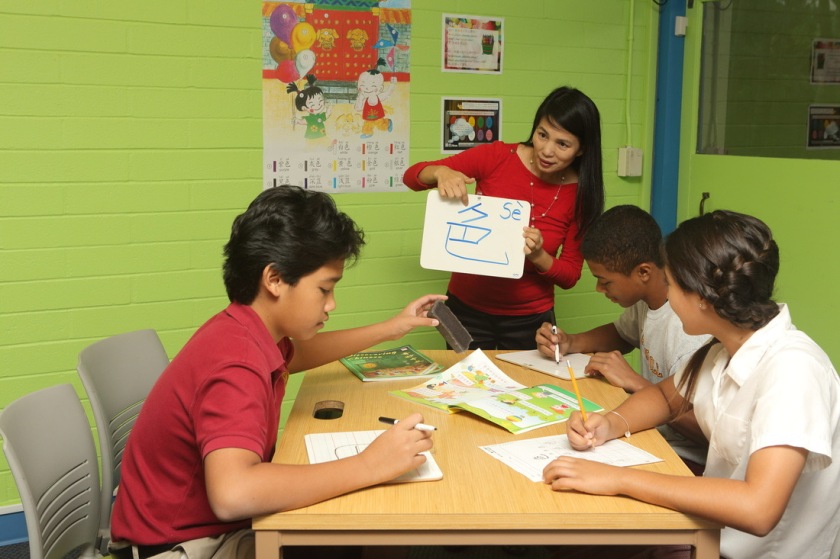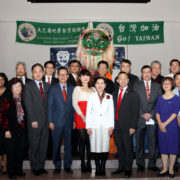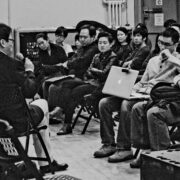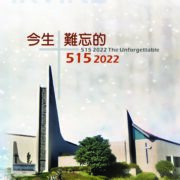“We are not puppies, we are who we are”: A Voice from the Indigenous Taiwanese Diaspora
Written by Yi-Yu Lai

Image Credit: photo provided by author
My first meeting with Ajaon (pictured above), who comes from an Atayal community in La-la Mountain, occurred at a Sunday Eucharist of an Episcopal church when I moved to Honolulu two years ago. I was sitting with my schoolmate Sra in the front row of the church, watching Ajaon directing a handbell choir. Sra originated from an Amis community in Taiwan. Such an Indigenous background brought him a connection with Ajaon when we started our study at the University of Hawaii. We usually went to the church with Ajaon every Sunday morning before the pandemic, and it helped us feel attached to Taiwan when we were still new in Hawaii. Ajaon is the only Taiwanese in that church, while most attenders are Tongan, Ilokano, Cantonese, and Chuukese people. Since the church attendees are primarily immigrants, their interconnections have created a community to share everyday experiences.
I had mixed feelings about overseas Taiwanese after I approached the broader Taiwanese diasporic community. One of the reasons is that some elders usually encourage us to speak Taiwanese in gatherings. They insist that “Taiwanese people should speak in Taiwanese” because Mandarin, which was introduced as a standard daily language by the Kuomintang (Nationalist Party of China, KMT) authorities, is almost replacing our habitual languagesnowadays. The elders retain their belief in language usage because it represents their national identity of homeland politics. To some extent, I can relate to this narrative. As a person whose mother tongue is Taiwanese, I seldom have chances to speak in my own language. But what about Indigenous people like Sra and Ajaon? Where is the space for their own languages in terms of this narrative? The emphasis on Taiwanese obviously erases the internal differences in the Taiwanese diaspora.
Apart from the language issue, Ajaon told me that stereotypes of Indigenous people back home are usually brought to the diasporic community. For example, when she moved to Hawaii several years ago, she was often invited to Taiwanese events because they wanted her to perform. At the beginning of her settlement in Hawaii, she hardly refused these invitations. Sometimes she even brought her children to join the staging. Nevertheless, she does not want to be labelled as the one who is merely a talented performer, although her major in college was actually music. “People would only know that you are good at singing and dancing as an Indigenous people, and they are barely interested in who you really are,” she said.
She took the anniversary of the February 28th Incident of 1947 as an example to illustrate. Since many Taiwanese immigrants moved to Hawaii due to this revolt and the following resistances against Kuomintang authorities, the commemoration has almost become a regular event in the diasporic community of Hawaii. However, why should Indigenous people perform at the event? Is it because they need someone to perform or want Indigenous people to be a representative? How about the voices of Indigenous people when it comes to this historical incident?
“Why I should be there is a much more crucial question that I need to ask myself first,” Ajaon realized this after she gradually acclimated herself to a new life in Hawaii. As she mentioned, she used to live in a neighbourhood where there were almost no Taiwanese people. As her neighbours had no preconceived ideas about Taiwanese or Indigenous Taiwanese, they were always interested in new residents like her. “From then on, I began to think of who I am when they started to ask me ‘Who are you?’” Thus, she finally moved away from the shadow of the stereotype of Indigenous Taiwanese. At the same time, she is still proud of her Indigenous blood, culture as well as identity. From her perspective, she can still be invited to perform, but “I will be there because I am Ajaon, and I will be there to fight that I am the Indigenous people out of any others’ stereotype,” she emphasized.
In fact, her awareness also leads to thinking about her career. As a Chinese teacher in a private high school in Hawaii, Ajaon considers herself not just a teacher who is teaching Chinese. Instead, she attempts to teach her students that language usage is permanently attached to continuously changing cultures. For example, in one of the hula competitions for the ‘May Day’ celebrations in Hawaii several years ago, Ajaon collaborated with an art teacher and taught their students how to perform traditional chants and dances of her community. While these teachers and parents were surprised with the innovation in the hula competition, it is important to note that this might be an example for students to think about their roots. Moreover, it may aid in creating a bridge between the past and the future.
Through fighting against Indigenous stereotypes, Ajaon’s realization shows that banality not only influences the interactions between Indigenous and non-Indigenous people. This is because it also has a significant impact on the mentality of Indigenous people themselves. “We are not puppies, we are who we are.” As a minority in the community, Ajaon makes room for herself to make her voice heard.
Yi-Yu Lai is currently a PhD student in Anthropology at University of Hawaii at Manoa, USA, and he has studied the Indigenous resistance in the highland Philippines since 2014. Focusing on the issues of political violence and Indigenous politics, he has participated in countless academic, voluntary, and cultural exchanging projects in Taiwan, Hawaii, and the Philippines.
This article was published as part of a series on Taiwanese Americans.
– Source: original post
– Posted on: 06/24/2021





